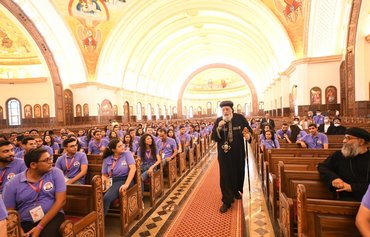The Church of St. Peter and St. Paul in Cairo held a mass service on Monday (December 11th) to mark the first anniversary of the terror bombing claimed by the "Islamic State of Iraq and Syria" (ISIS), that killed 29 Copts and injured many others.
The church, which is attached to the Saint Mark's Coptic Orthodox Cathedral in Cairo's Abbasiya district, came under a suicide bombing attack on December 11th, 2016.
Bishop Julius of Old Cairo headed the mass service which was attended by many priests, families of victims and survivors.
The Armed Forces Engineering Authority completed the rehabilitation of the church in just 20 days to remove any signs of destruction.
Masses were held again at the church as of January 3rd, 2017.
The church commemorated the first anniversary of the martyrs' deaths with special prayers and a mass attended by their families, said Sameh Fawzi, a writer specialising in Coptic affairs.
"All Egyptians are one hand and united against terrorism," he said.
Egyptian forces hunt down perpetrators
The attack prompted security agencies to fully mobilise in pursuit of the perpetrators.
The suicide bomber, Mahmoud Shafiq Mohammed, was seen on surveillance cameras walking up to the prayer hall where dozens of Christian worshippers were praying. He then detonated his explosives vest, causing a huge blast.
Investigations into the case uncovered how the terror cell members planned the operation outside Cairo until they managed to reach the heart of the capital and hide in a flat in al-Zeitoun district.
They monitored the church for several days before they carried out the operation.
Military expert Maj. Gen. Farid Hajjaj said the attack marked the emergence of one of the most dangerous terror cells in recent years.
"It is led by Amr Saad who planned the attack, as he did with the two other attacks which targeted St. George's Church in Tanta and St. Mark Church in Alexandria, in April 2017," he told Al-Mashareq.
The three attacks prompted a review of church security plans, he said, adding that "it has now become very difficult to carry out similar operations in internal provinces".
"The security forces identified the perpetrator and the cell members in two days, and arrested two elements -- Rami Abdul Hamid and Walid Abul Magd who are now standing trial before a military court," said Hajjaj.
The attack has affected all Egyptians, especially families of victims, but it has also revealed the extent of "solidarity, unity and cohesion of the people", he added.
"Egyptians are confident that terrorism has no religion and that it is targeting all without any discrimination," he said.

![Egyptian security forces and onlookers gather outside the St. Peter and St. Paul Coptic Orthodox Church, which is adjacent to the Saint Mark's Coptic Orthodox Cathedral, after it was hit by an explosion on December 11th, 2016 in the Abbasiya neighbourhood in Cairo. [Khaled Desouki/AFP]](/cnmi_am/images/2017/12/11/10683-Egypt-Cairo-church-600_384.jpg)




